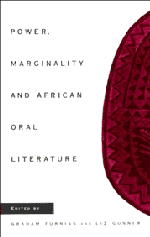Book contents
- Frontmatter
- Contents
- List of contributors
- Preface
- Note on transcription
- 1 Introduction: power, marginality and oral literature
- Part I Orality and the power of the state
- Part II Representing power relations
- Part III Oral forms and the dynamics of power
- Part IV Endorsing or subverting the paradigms: women and oral forms
- Part V Mediators and communicative strategies
- 15 Power and the circuit of formal talk
- 16 Praise splits the subject of speech: constructions of kingship in the Manden and Borgu
- 17 Beyond the communal warmth: the poet as loner in Ewe oral tradition
- Bibliography
- Index
17 - Beyond the communal warmth: the poet as loner in Ewe oral tradition
Published online by Cambridge University Press: 18 December 2009
- Frontmatter
- Contents
- List of contributors
- Preface
- Note on transcription
- 1 Introduction: power, marginality and oral literature
- Part I Orality and the power of the state
- Part II Representing power relations
- Part III Oral forms and the dynamics of power
- Part IV Endorsing or subverting the paradigms: women and oral forms
- Part V Mediators and communicative strategies
- 15 Power and the circuit of formal talk
- 16 Praise splits the subject of speech: constructions of kingship in the Manden and Borgu
- 17 Beyond the communal warmth: the poet as loner in Ewe oral tradition
- Bibliography
- Index
Summary
Song texts by major Ewe oral poets reveal the poets as loners, frequently celebrated and even envied but marginalised individuals, expressing their opinions from beyond the mainstream of their communities though eternally engaged with issues central to communal life. This persistent theme of the poet's ultimate loneliness points to a context of ambiguities and paradoxes in which society celebrates poetry but tends to ignore or even threaten the poet, a context in which the poet often laments the gift of song as a social handicap but then boasts about the power of song to transpose society's achievements and failures into monuments that may outlast material and social prestige. A close critique of the politics of song in Ewe oral tradition suggests that, at least in certain cases, the dominance of images of loneliness may be an essentially artistic, symbolic projection that need not reflect actual circumstances of the poet's life and social standing:
I am on the world's extreme corner,
I am not sitting in the row with the eminent
But those who are lucky
Sit in the middle and forget
I am on the world's extreme corner
I can only go beyond and forget.
(Awoonor 1990: 49–50)These lines originally from Akpalu Vinoko and incorporated into the poem ‘Songs of sorrow’ by Kofi Awoonor, underscore the Ewe poet's view of himself as a loner, an often celebrated, even envied, but marginalised individual.
- Type
- Chapter
- Information
- Power, Marginality and African Oral Literature , pp. 244 - 259Publisher: Cambridge University PressPrint publication year: 1995

